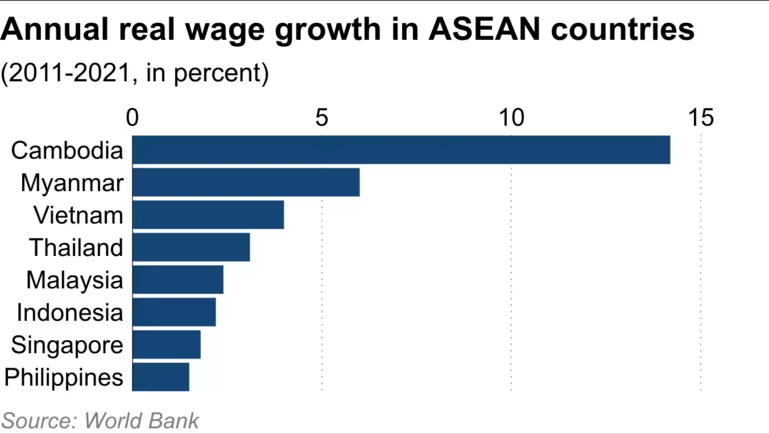Malaysia to Introduce Progressive Wage Policy: Improving Living Standards of Low-Income Workers
Malaysia plans new wage package for low-income workers to target small businesses in a "gradual" model, but effectiveness questioned。
The Malaysian government will introduce a new wage policy to raise wages for low-income workers in response to rising living costs and rising inequality.。
Malaysian Economy Minister Rafizi Ramli told parliament last week when he unveiled the plan that wage statistics for the first quarter of 2023 showed that 47 percent of Malaysia's working people earned less than the poverty line of 2,589 ringgit (about $550) a month.。
"Low wages have seriously affected the lives of domestic workers, who spend most of their wages on basic needs and have little savings," Rafizi said.。
It is reported that the "progressive wage policy" will be implemented in June 2024, when 1,000 companies will participate in the pilot project.。Under the policy, employers will gradually raise wages based on workers' skills, experience and performance.。
The policy will focus on small and medium-sized enterprises, which make up the vast majority of Malaysia's workforce, and will be implemented in phases to complement the existing minimum wage policy.。
Malaysia introduced the minimum wage in 2012 and has since raised the wage floor for the lowest category of workers, which currently stands at 1,500 ringgit per month.。But Rafizi said the policy has also led to wage compression over the years, causing wages for skilled and semi-skilled workers to stagnate.。
The pay of higher education graduates entering the labour market has been sluggish, falling from 2,066 ringgit per month before the epidemic in 2019 to 1,624 ringgit in 2022, a drop of up to 21.4%。

The World Bank's Malaysia Economic Monitor report, released in October, noted that the wage gap between low-skilled and high-skilled workers has widened over time, from RM1,800 per month in 2010 to RM2,474 in 2021, an increase of 37 per cent..4%。Annual real wage growth in Malaysia between 2011 and 2021 is 2.4%, compared to 3 in Thailand.1% in Vietnam, 4.0%。
The chairman of the Federation of Malaysian Manufacturers (FMM), Soh Thian Lai, hailed the move, which the industry group believes will boost wage growth for SMEs.。But he added that employers would be "resource constrained" if labour costs rise.。
The Malaysian government said the scheme would be launched on a voluntary basis and would provide financial support to businesses to help them comply.。Rafizi told parliament the government would spend 2 billion ringgit to implement the new policy, with results reaching 1.05 million laborers.。
Juita Mohamad, director of the Department of Economics and Commerce at the Malaysian Institute for Democracy and Economic Affairs (IDEAS), offered a different opinion.。In her view, the effect of the policy may be limited by its voluntary nature。
Juita said: "Since there is no specific industry or occupation, coupled with the voluntary nature, it is unlikely that domestic wage increases will exceed the minimum wage in the short term.。But if the policy is mandatory and targeted at selected industries and occupations, it will help increase wages and productivity in the medium to long term, provided that workers are trained to meet their needs.。"
Moreover, the impact of the policy on foreign companies in Malaysia is likely to be limited, as wages and remuneration for foreign companies are usually higher than for local companies.。Once resources are limited, foreign and local companies may withdraw from the Malaysian market at any time.。
However, companies may be able to use this policy to attract and retain scarce talent in the labor market as it successfully combines wage growth with rare training opportunities。
·Original
Disclaimer: The views in this article are from the original Creator and do not represent the views or position of Hawk Insight. The content of the article is for reference, communication and learning only, and does not constitute investment advice. If it involves copyright issues, please contact us for deletion.